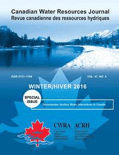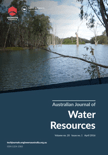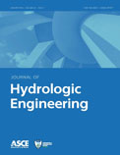
Hydrology
Scope & Guideline
Unlocking insights for effective water management.
Introduction
Aims and Scopes
- Hydrological Modeling and Simulations:
The journal consistently publishes studies focused on various hydrological modeling techniques, including both traditional and innovative approaches. These models help in predicting water flow, quality, and availability under varying climatic and anthropogenic scenarios. - Water Quality Assessment and Management:
Research on water quality, including assessments of pollutants and their sources, is a core area of focus. This includes studies on the impacts of land use, agricultural practices, and industrial activities on water bodies. - Climate Change Impacts on Hydrology:
Many papers address the effects of climate change on hydrological cycles, including changes in precipitation patterns, evaporation rates, and streamflow dynamics, providing insights into future water resource availability. - Groundwater Studies:
Groundwater research is prominently featured, with studies on recharge mechanisms, contamination, and sustainable management practices, reflecting the importance of groundwater in global water security. - Integrated Water Resource Management:
The journal emphasizes interdisciplinary approaches to water resource management, incorporating socio-economic, ecological, and hydrological perspectives to develop sustainable management strategies. - Innovative Technologies in Hydrology:
There is a growing focus on the application of advanced technologies, such as remote sensing, machine learning, and IoT, to improve hydrological assessments and predictions.
Trending and Emerging
- Machine Learning and Data-Driven Approaches:
There is a marked increase in the use of machine learning and data-driven methodologies for hydrological predictions, modeling, and analysis, indicating a trend towards leveraging big data in hydrology. - Climate Resilience and Adaptation Strategies:
Research focusing on climate resilience, adaptation strategies, and the impacts of extreme weather events is gaining traction, highlighting the urgency of addressing climate-related challenges in water resource management. - Integrated Approaches to Water Quality and Quantity:
Emerging studies are increasingly focusing on integrated approaches that consider both water quality and quantity, particularly in the context of the Water-Energy-Food nexus, emphasizing the interconnectedness of these elements. - Impact of Anthropogenic Activities:
Research examining the impact of human activities on hydrological processes is on the rise, with studies exploring urbanization, agriculture, and industrial impacts on water resources. - Nature-Based Solutions:
There is a growing interest in nature-based solutions for water management, such as wetlands restoration and green infrastructure, reflecting a shift towards sustainable and eco-friendly water management practices.
Declining or Waning
- Traditional Hydrological Methods:
There is a noticeable decrease in publications utilizing conventional hydrological methods without integration of modern technologies or interdisciplinary approaches. This indicates a shift towards more innovative techniques. - Focus on Localized Case Studies:
Research that solely focuses on localized case studies without broader implications or applications is becoming less prevalent, suggesting a move towards studies that offer insights applicable to wider contexts. - Purely Theoretical Studies:
The journal appears to be moving away from purely theoretical discussions without practical applications, as there is a stronger emphasis on applied research that addresses real-world hydrological issues.
Similar Journals

Journal of Hydrology X
Innovating Hydrology: Bridging Research and PracticeJournal of Hydrology X, a premier publication in the field of water science and technology, is published by ELSEVIER from the Netherlands. Since transitioning to Open Access in 2018, this journal has provided researchers, professionals, and students unrestricted access to vital research findings and advancements in hydrology. With an impressive Q1 category ranking in 2023, and a Scopus ranking of #41 out of 261 in Environmental Science, it stands at the forefront of water-related studies, showcasing high-quality, peer-reviewed articles that drive innovation and collaboration. The journal focuses on integrative approaches from 2019 to 2024, catering to a diverse audience eager to advance the understanding and management of freshwater resources globally. Its commitment to disseminating impactful research makes it an essential resource for anyone working in or studying this vital field.

Water Resources
Advancing sustainable solutions for our most vital resource.Water Resources, a prominent journal published by MAIK NAUKA/INTERPERIODICA/SPRINGER, focuses on the critical and evolving field of water science and technology. Established in 1976 and with a long-standing commitment to advancing knowledge, this journal explores interdisciplinary research that addresses the challenges surrounding water resource management, quality, and sustainability. With an impact factor positioned within the Q3 category of its field, it holds a notable Scopus rank (#181/261) in Environmental Science, emphasizing its role in driving scholarly discourse. While currently not open access, Water Resources provides vital insights for researchers, professionals, and students, making it an essential resource for those seeking to innovate and implement effective water management solutions. To stay ahead in a domain that is increasingly paramount to global sustainability efforts, consider engaging with the latest research published in this vital journal.

Journal of Hydrology and Hydromechanics
Pioneering insights into fluid flow and water systems.Journal of Hydrology and Hydromechanics, published by SCIENDO, is a prominent open access journal that has been disseminating crucial research findings in the fields of fluid flow, mechanical engineering, and water science since its inception in 1973. With its open access model established in 2009, the journal ensures that innovative research is available to a global audience, enhancing the visibility and impact of studies related to hydrological systems and their applications. The journal holds a commendable position within the academic community, reflected in its category quartiles, achieving Q2 rankings in 2023 across key areas such as Fluid Flow and Transfer Processes, Mechanical Engineering, and Water Science and Technology. Its Scopus rankings further highlight its relevance, placing it among the top journals in its categories. The Journal of Hydrology and Hydromechanics not only serves as a vital resource for researchers and professionals aiming to advance hydrological knowledge but also provides students with a wealth of information to better understand the complexities of water dynamics and associated engineering challenges.

JOURNAL OF THE AMERICAN WATER RESOURCES ASSOCIATION
Empowering professionals with essential knowledge in water science.The JOURNAL OF THE AMERICAN WATER RESOURCES ASSOCIATION, published by Wiley, is a premier platform dedicated to advancing the field of water resource management and research. With an ISSN of 1093-474X and an impressive Q1 ranking in multiple categories, including Earth-Surface Processes, Ecology, and Water Science and Technology, this journal serves as a vital resource for professionals, researchers, and students alike. Established in 1967 and set to converge through 2024, it has consistently published cutting-edge research that influences policy and practice in water resource management. The journal's open access option enhances its reach, ensuring that critical findings are accessible to a wider audience. The Scopus rankings further underscore its impact, placing it in the top quartile within its fields, highlighting its importance in shaping scholarly discourse. As a significant contributor to the understanding and management of freshwater systems, the journal offers a crucial means for sharing insights and fostering collaboration in the vital realm of water resources.

Canadian Water Resources Journal
Elevating discourse in the realm of water science.Canadian Water Resources Journal, published by Taylor & Francis Inc, is a leading academic journal dedicated to the field of water science and technology. With a significant history dating back to its inception in 1976, the journal offers a platform for high-quality, peer-reviewed research that addresses critical issues in water resources management, hydrology, water quality, and policy. The journal is recognized for its valuable contributions to the field, exemplified by its classification in the Q2 category for Water Science and Technology and holding a respectable rank of #137 out of 261 in the Scopus Environmental Science category. While it does not currently offer open access, its articles remain accessible through various institutional subscriptions, ensuring that professionals, researchers, and students stay updated with the latest advancements and discussions in water resources. As it converges towards its ongoing publication commitment through 2024, the Canadian Water Resources Journal remains an essential resource for those engaged in the pursuit of sustainable water management solutions.

Australasian Journal of Water Resources
Elevating the Discourse on Water SustainabilityThe Australasian Journal of Water Resources, published by Taylor & Francis AS, stands as a pivotal resource in the field of water science and technology. With an ISSN of 1324-1583 and E-ISSN 2204-227X, this esteemed journal facilitates the dissemination of high-quality research articles that address critical issues facing water resources management across Australasia and beyond. Ranking in the Q2 category for Water Science and Technology as per the 2023 metrics, it boasts an impressive Scopus ranking of 75/261 in Environmental Science, placing it in the 71st percentile for its field. Spanning from 2008 to 2024, the journal emphasizes the importance of sustainable water practices, innovative technologies, and environmental policy, making it an invaluable asset for researchers, professionals, and students seeking to advance their knowledge and contribute to the discourse on water management challenges. The journal's rigorous peer-review process and commitment to open academic dialogue ensure that emerging trends and pioneering ideas receive the attention they deserve.

Hydrology Research
Unleashing knowledge for sustainable water practices.Hydrology Research, a leading academic journal published by IWA Publishing, is dedicated to advancing the field of water science and technology. With an impressive impact factor and a Q2 ranking in its category, the journal plays a pivotal role in disseminating innovative research and practices in hydrology. Established in 1973 and transitioning to an Open Access model in 2020, it provides unrestricted access to high-quality articles that cover a broad spectrum of topics, including hydrological processes, water management, and environmental impact assessments. Situated in Denmark, Hydrology Research continues to thrive as an essential platform for researchers, professionals, and students alike, encouraging the exchange of ideas that contribute to sustainable water solutions worldwide. With a comprehensive coverage of research converging from 1973 to 2024, it stands as a testament to ongoing progress in the water science community.

Water Research X
Pioneering research for a water-secure future.Water Research X is a prestigious journal published by ELSEVIER, focusing on the dynamic fields of water science and technology, pollution, ecological modeling, and waste management. Since its inception in 2018, this Open Access journal has become a cornerstone resource for researchers and professionals dedicated to advancing our understanding and management of water resources. Based in the United Kingdom, Water Research X holds an impressive ranking within the Scopus metrics, positioned in the Q1 category across multiple relevant disciplines, including Environmental Science, with a notable rank of 10/261 in Water Science and Technology and 3/41 in Ecological Modeling. This reflects its commitment to disseminating high-quality research that informs policy, supports sustainable practices, and fosters innovation in water management.

JOURNAL OF HYDROLOGIC ENGINEERING
Empowering Engineers with Cutting-Edge InsightsJOURNAL OF HYDROLOGIC ENGINEERING is a premier academic journal published by the ASCE - American Society of Civil Engineers, dedicated to advancing the field of hydrologic engineering through the dissemination of innovative research and methodologies. With an ISSN of 1084-0699 and E-ISSN 1943-5584, this journal serves a global audience and has established itself as an essential resource for professionals, researchers, and students in the civil and environmental engineering disciplines. Currently ranked in the Q2 category across multiple areas including Civil and Structural Engineering and Water Science and Technology, the journal promotes high-quality, peer-reviewed articles that address critical challenges in hydrology, water resources, and environmental management. Despite not being an open-access journal, it offers valuable insights that drive progress in sustainable engineering practices. The convergence of research from 1996 to 2024 makes it an invaluable archive for historical and cutting-edge contributions to the field, reflecting its commitment to fostering knowledge and innovation in hydrologic engineering.

Hydrologie und Wasserbewirtschaftung
Championing research for responsible water stewardship.Hydrologie und Wasserbewirtschaftung, published by the BUNDESANSTALT GEWASSERKUNDE-BFG, stands as a vital open access journal in the field of hydrology and water management since its inception in 1999. Based in Germany, this journal aims to disseminate high-quality research related to water resources, environmental sustainability, and innovative management strategies. Though it has a Q4 ranking in Water Science and Technology for 2023, and holds a Scopus rank of 113 out of 225, the journal provides an essential platform for researchers, professionals, and students interested in advancing their understanding of water science. With coverage spanning from 1999 to 2018 and a seamless move to an open access model, Hydrologie und Wasserbewirtschaftung remains committed to contributing to the ongoing dialogue around critical water issues. Researchers looking to publish their findings or stay abreast of developments in water science will find this journal indispensable.